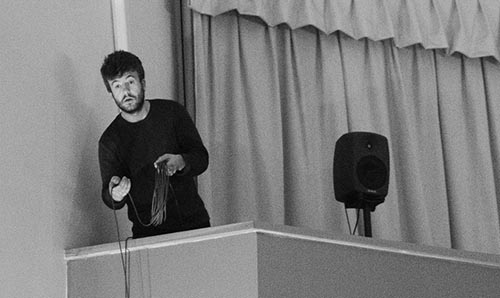Patrick Shepherd
Why did you choose to study at The University of Manchester?

I was walking down Canal Street after a night out when I decided that this was where I wanted to be.
What has been the highlight of your course so far?
There have been loads, so here are a few.
Recently, learning the possibilities of the music programming and audio synthesis platform SuperCollide.
Another highlight was generally the privilege of having my pieces performed, and the culture around composition at The University of Manchester. Specifically, the performance of my final portfolio piece for my undergraduate degree. It was a four-channel composition for Tenor, Trombone, Tuba and fixed media. This was a highlight because I was able to really enjoy the fruits of my labour, but also able to celebrate the music written by my peers in a supportive and encouraging environment.
The Tuesday of Estival 2019 (Estival is the end-of-year week of music-making for MUMS) was also a favourite. I thoroughly enjoyed being the President of MUMS in 2018-19, and that day was the busiest of the year. There were two concerts and a range of activities that we organised in that day as well as a pub quiz. Then to top it all off, I was doing the sound for the gig in the evening. I was tired but extremely satisfied.
What has been the most challenging part of your course so far?
The most challenging aspect of my undergraduate degree was learning to take responsibility for my time and ensure a reasonable degree of organisation. It was a positive challenge that I enjoyed overcoming, despite the embarrassing hiccups of having double-booked myself or forgetting the occasional commitment. This was one of the toughest lessons to learn but one of the most important.
What subject areas are you interested in?
Sound Design, Interactive performance, Interactive composition.
What is the best thing about living and studying in the city of Manchester?
Mancunians. Mancunians are my favourite people. It’s a privilege to be in a city full of them.
Are you involved in any extracurricular activities?
I was deeply involved in the student music-making scene as President of the University Chorus in 2017-18, then President of the Music Society in 2018-19. Both of these were a huge responsibility that I really enjoyed even if it was exhausting at times.
What are your plans for life after graduation?
I take real joy in not knowing, and I am grateful for the privilege of not being too worried about it.
I currently work at Sandbar and for a wonderful music charity called Olympias Music Foundation who focus on celebrating diversity in music.
When I finish my master’s, I would love to continue to study Electroacoustic Composition and Interactive Media on a PhD, but I may have to wait a few years.
